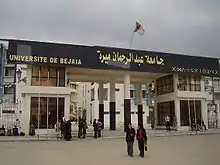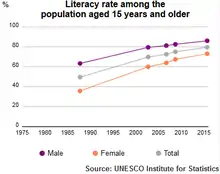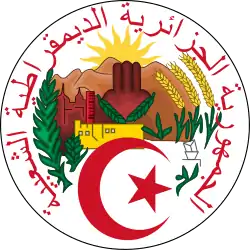Education in Algeria
Education in Algeria is free and compulsory for Algerians from the ages of 6 to 15.[1] However, only half of Algerian students are enrolled in secondary schools.[2] As of 2015, Algeria has 92 post-secondary institutions, which includes 48 universities.[3]
| Ministry of National Education | |
|---|---|
| General details | |
| Primary languages | Arabic , French . |
| Literacy (2015) | |
| Total | 80% |
| Male | 87% |
| Female | 73% |
History
Before the conquest of Algiers by France in 1830, religious lands called hubus paid for Muslim teachers.[4] When the French conquered Algeria, they seized the hubus, which ended traditional education funding.[4] During the colonization of Algeria, Napoleon III reestablished the usage of madrasa schools and created primary schools that were both Arabic and French.[5] However, during the Third Republic, the Parisian government tried to assimilate Algerians into the French culture, but their policies were frustrated by white colonists who blocked funding for new schools.[4] After the war for independence, Algeria introduced several policies to reform and strengthen the educational structure. The Ministry of Education was created in 1963.[6]
Educational System

In Algeria, 24% of children are enrolled in pre-school.[7] New reforms have been implemented since 2003 to make pre-schooling more accessible.
Primary school lasts for 5 years.[6] Then, students move on to 4 years of lower secondary school and 3 additional years of upper secondary school.[6] Primary and Lower Secondary Education, which is termed "Enseignment Fondemental" is the basic education that everyone is required to receive.[8] If students wish to pursue higher education, they must take the baccalauréat, a national exam.[6]
There are 57 public institutions for higher education, which include "27 universities, 13 university centers, 6 national schools (écoles nationales), 6 national institutes (instituts nationaux), and 4 teacher-training institutes (écoles normales supérieures)."[6] As of 2015, Algeria has 92 post-secondary institutions, which includes 48 universities.[3] People typically study three years for a bachelor's degree, two years for a Master's Program, and three years for a doctorate.[6]
.jpg.webp)
Languages
Students are primarily taught in Arabic, although teachers have been allowed to teach in Berber as of 2003. Berber teaching is allowed in Algerian schools to remove the complaints of Arabization and need for non-Algerian teachers.[2]
Before colonialism, Algeria was home primarily to Arabic and Berber speakers.[4] Due to Algeria's French colonial past, French was the first foreign language taught in Algerian schools.[9] However, a month before independence, Algerian revolutionary leaders declared that the future State would be committed to arabisation.[10] Ahmed Ben Bella implemented linguistic arabisation laws in primary schools and required teaching in Arabic on all levels from 1963-1964.[10] In 2004, language restrictions were enforced that made 90% of all teaching in Algerian schools in Arabic.[11] In November 2005, Parliament passed laws that banned private schools from teaching in any other language but Arabic.[10]
Linguistics has been a source of contention for the Algerian educational system. The shift from bilingualism in French and Arabic to monolingualism in Arabic has created issues with graduates trying to enter the economic market.[10]
Literacy

The literacy rate in Algeria has improved significantly over the past decades. In 1950, the Algerian adult literacy rate was less than 20%.[12] After independence in 1962, more than 85% of the population was still illiterate.[13] As of 2015, Algeria's literacy rate is estimated to be around 80%, higher than the literacy rates of Morocco and Egypt, but lower than Libya's literacy rate. Of the 2015 literacy rate, 87% of Algerian males are literate, compared to 73% of Algerian females.[14]
Funding and Employment
Education makes up 15% of Algeria's national budget.[15] Algeria has one of the largest shortages of teachers in Northern Africa, with 200,000 primary teachers needed to help reach the United Nations's Sustainable Development Goal for education.[16]
Education by numbers
The number of children enrolled in school has increased significantly post-independence. In 1962, there were only 750,000 children enrolled in primary school and 3,000 students attending universities.[17] By 1984, there were more than 900,000 students enrolled in school and 107,000 students in college.[17] In 2005, enrollment rates were about 97% at primary school level and 66% at secondary school level.[18]
According to statistics by the UNESCO Institute for Statistics for the 2011–2012 academic year[19]
| Pupils | Census |
|---|---|
| Primary school | 3.452.000 |
| Lower secondary school | 3.240.000 |
| Upper Secondary school | 1.333.000 |
| Total | 8.023.000 |
See also
References
- Singh, Kishore. "Report of the Special Rapporteur on the right to education". ohchr.org. Retrieved 19 October 2016.
- Algeria country profile. Library of Congress Federal Research Division (May 2008). This article incorporates text from this source, which is in the public domain.
- Naylor, Phillip, C. (2015). Historical Dictionary of Algeria. p. 221. ISBN 978-0810879195. Retrieved 20 October 2016.
- Segalla, Spencer D. (2009-01-01). Moroccan Soul: French Education, Colonial Ethnology, and Muslim Resistance, 1912–1956. U of Nebraska Press. ISBN 978-0803224681.
- Naylor, Phillip, C. (2015). Historical Dictionary of Algeria. p. 404. ISBN 978-0810879195. Retrieved 20 October 2016.
- "Education in Maghreb: Algeria - WENR". wenr.wes.org. April 2006. Retrieved 2017-03-24.
- Bouzoubaa, Khadija; Benghabrit-Remaoun, Nouria (2004). "Pre-School Education in Morocco and Algeria1". Prospects. 34 (4): 471–480. doi:10.1007/s11125-005-2738-x. S2CID 144340313.
- "Algeria". Education Policy Data Center. Retrieved 2017-03-24.
- Negadi, Mohammed Nassim (August 2015). "Learning English in Algeria through French-based background proficiency". Procedia - Social and Behavioral Sciences. 199: 496–500. doi:10.1016/j.sbspro.2015.07.537.

- Benrabah, Mohamed (2007-06-01). "Language-in-Education Planning in Algeria: Historical Development and Current Issues". Language Policy. 6 (2): 225–252. doi:10.1007/s10993-007-9046-7. ISSN 1568-4555. S2CID 144173685.
- The Report: Algeria 2014. Oxford Business Group. 2014-12-30. p. 217. ISBN 978-1-910068-20-5.
- "Education for All Global Monitoring Report" (PDF). UNESCO: 193. 2006.
- Learning, UNESCO Institute for Lifelong (2015-11-24). "Effective Literacy Programmes". www.unesco.org. Retrieved 2017-03-23.
- "The World Factbook". cia.gov. Retrieved 19 October 2016.
- "UNICEF Annual Report 2015 Algeria" (PDF). unicef.org. Retrieved 20 October 2016.
- "The world needs almost 69 million new teachers to reach the 2030 education goals" (PDF). uis.unesco.org. Retrieved 19 October 2016.
- Entelis, John P. (2016-01-08). Algeria: The Revolution Institutionalized. Routledge. p. 117. ISBN 978-1-317-36097-1.
- "Algeria: Education". EIU ViewsWire. 1 April 2008. ProQuest 466507125.
- "National Education Profile 2014 Update" (PDF). epdc.org. Archived from the original (PDF) on 10 January 2017. Retrieved 19 October 2016.
Further reading
- Aimeur, Roza. "Project-Based Learning in the Algerian Secondary School Syllabuses and Textbooks" (Archive; Degree of Magister in English). Mouloud Mammeri University of Tizi-Ouzou. 2010/2011.
External links
 Media related to Education in Algeria at Wikimedia Commons
Media related to Education in Algeria at Wikimedia Commons
